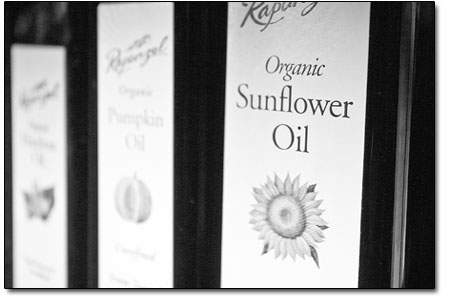|
| ||
| Oiling up SW Colorado SideStory: A look inside San Juan Bioenergy
by Will Sands The oil crusher will come alive next week in Dove Creek. After many years of planning and build-up, San Juan Bioenergy is officially ready to begin production. However, the road to next week’s opening has required perseverance and flexibility, and a vision that began as a push to grow biofuels in the region now has a much broader focus. In 2004, a former director of the conservation group Colorado Wild hatched the idea of growing fuel in the region. Jeff Berman – now the chief executive officer of San Juan Energy, LLC – had been working with area ski resorts to green up their operations by getting more biodiesel into their vehicle fleets. Those early discussions eventually evolved into a dream of growing energy locally and fueling vehicles with an environmentally friendly, plant-based alternative. The San Juan Basin Biodiesel Cooperative – a consortium of biodiesel fleet managers, biodiesel users, agricultural interests and renewable energy proponents – was the first outgrowth of talks. The cooperative’s first order of business was for Berman – then working as a consultant – to explore the feasibility of growing biodiesel seed crops and building a processing facility somewhere in Southwest Colorado. Identifying agricultural promise and favorable real estate pricing, the cooperative turned its eye on Dove Creek, the self-proclaimed “pinto bean capital of the world” located in western Dolores County. And as a first step, farmers grew a 100-acre test crop to see if the local landscape would support a biodiesel effort. Sunflowers were selected as a suitable crop for the high desert around Dove Creek. With only 5 percent of the region’s farmland under irrigation, the flower’s drought resistance fit nicely with the area’s predominantly dryland farming. Farmers saw immediate results, harvesting as many as 800 pound of sunflower seeds per acre, compared to an average of 75 pounds of pintos. With the promise of this new cash crop, many growers started shifting their production from beans to flowers, and 15,000 acres in and around Dove Creek are now devoted to growing sunflowers for oil production. The promise of a new crop was enticing for the relatively depressed region of Dolores County as well, and Dove Creek got behind the cooperative effort. The municipality donated land just outside of town to the plant and created the Weber Industrial Park. Dove Creek also provided the initial power to operate the plant during the construction phase. Over the next few years, several other things shifted for the cooperative, however. Prior to breaking ground last fall, San Juan Basin Biodiesel learned that it could not obtain the necessary construction loans as a co-op. Consequently, the group changed its business structure into a limited liability corporation. Demand for biodiesel also wavered during the project’s construction stages, making the viability of an enterprise devoted solely to biofuels highly questionable. In response, the effort shifted its calling and changed its name to San Juan Bioenergy, LLC. “The biggest challenge has always been ensuring that we can produce the biodiesel and make money at it,” Berman said. “If you can’t do that without at least breaking even, you’re not going to be doing it for very long.” These realities and a volatile biofuels market have temporarily steered San Juan Bioenergy away from the gas tank and toward the grocery shelf. The company will begin its early years producing premium sunflower oil for human consumption. “We respond to what the market tells us,” Berman said. “Sunflower oil has been priced at a premium relative to other oils. It currently makes more sense to sell it as a food-grade oil than turn it into fuel.” The dream of having local control over the local energy system has not disappeared, or even dimmed, however. With the oil-crushing plant opening next week, San Juan Bioenergy will turn its energies toward completing construction of its biodiesel production line. Biofuels production is set to begin in 2009 with a 10,000- to 15,000 gallon pilot plant. Based on the results of that effort, San Juan Biofuels will weigh the feasibility of larger, long-term production. “We’re now moving in the direction of biodiesel,” Berman said. “But we’re doing so cautiously, and we’re also looking at various ways to produce biofuels. Biodiesel is one option. We want to ensure that it will be a viable venture.”
|
In this week's issue...
- December 18, 2025
- Let it snow
Although ski areas across the West have taken a hit, there’s still hope
- December 18, 2025
- Look, but don't take
Lessons in pottery theft – and remorse – from SW Colorado
- December 11, 2025
- Big plans
Whole Foods, 270 apartments could be coming to Durango Mall parcel


